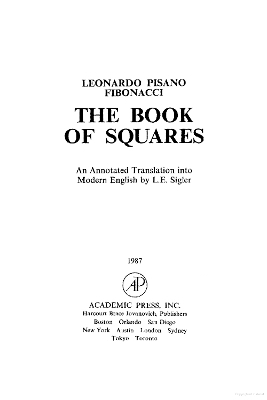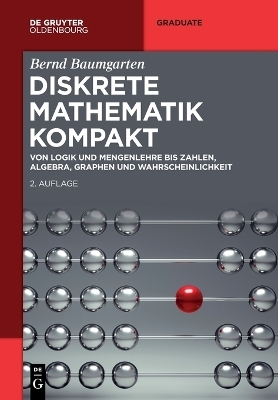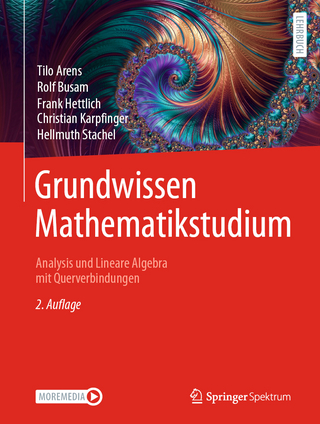
Leonardo Pisano (Fibonacci)
Academic Press Inc (Verlag)
978-0-12-643130-8 (ISBN)
The Book of Squares by Fibonacci is a gem in the mathematical literature and one of the most important mathematical treatises written in the Middle Ages. It is a collection of theorems on indeterminate analysis and equations of second degree which yield, among other results, a solution to a problem proposed by Master John of Palermo to Leonardo at the Court of Frederick II. The book was dedicated and presented to the Emperor at Pisa in 1225. Dating back to the 13th century the book exhibits the early and continued fascination of men with our number system and the relationship among numbers with special properties such as prime numbers, squares, and odd numbers. The faithful translation into modern English and the commentary by the translator make this book accessible to professional mathematicians and amateurs who have always been intrigued by the lure of our number system.
Prologue. Introduction. Proposition 1: Find Two Square Numbers Which Sum to a Square Number. Proposition 2: Any Square Number Exceeds the Square Immediately Before It by the Sum of the Roots. Proposition 3: There is Another Way of Finding Two Squares Which Make a Square Number with Their Sum. Proposition 4: A Sequence of Squares is Produced from the Ordered Sums of Odd Numbers Which Run from 1 to Infinity. Proposition 5: Find Two Numbers So That the Sum of Their Squares Makes a Square Formed by the Sum of the Squares of Two Other Given Numbers. Proposition 6: A Number is Obtained Which is Equal to the Sum of Two Squares in Two, Three, or Four Ways. Proposition 7: Find in Another Way a Square Number Which is Equal to the Sum of Two Square Numbers. Proposition 8: Two Squares Can Again be Found Whose Sum Will be the Square of the Sum of the Squares of Any Two Given Numbers. Proposition 9: Find Two Numbers Which Have the Sum of Their Squares Equal to a Nonsquare Number Which is Itself the Sum of the Squares of Two Given Numbers. Proposition 10: Find the Sum of the Squares of Consecutive Numbers from the Unity to the Last. Proposition 11: Find the Sum of the Squares of Consecutive Odd Numbers from the Unity to the Last. Proposition 12: If Two Numbers are Relatively Prime and Have the Same Parity, Then the Product of the Numbers and Their Sum and Difference is a Multiple of Twenty-Four. Proposition 13: The Mean of Symmetrically Disposed Numbers is the Center. Proposition 14: Find a Number Which Added to a Square Number and Subtracted from a Square Number Yields Always a Square Number. Proposition 15: Square Multiples of Congruous Numbers are Congruous Numbers. Proposition 16: Find a Congruous Number Which is a Square Multiple of Five. Proposition 17: Find a Square Number Which Increased or Diminished by Five Yields a Square Number. Proposition 18: If Any Two Numbers Have an Even Sum, Then the Ratio of Their Sum to Their Difference is Not Equal to the Ratio of the Larger to the Smaller. Proposition 19: Find a Square Number for Which the Sum and the Difference of It and Its Root is a Square Number. Proposition 20: A Square Number is Found Which When Twice Its Root is Added or Subtracted Always Makes a Square Number. Proposition 21: For Any Three Consecutive Odd Squares, the Greatest Square Exceeds the Middle Square by Eight More Than the Middle Square Exceeds the Least Square. Proposition 22: Find in a Given Ratio the Two Differences Among Three Squares. Proposition 23: Find Three Square Numbers So That the Sum of the First and the Second As Well As All Three Numbers are Square Numbers. Proposition 24: The Question Proposed by Master Theodore. References Index.
| Erscheint lt. Verlag | 28.1.1987 |
|---|---|
| Verlagsort | San Diego |
| Sprache | englisch |
| Maße | 152 x 229 mm |
| Gewicht | 410 g |
| Themenwelt | Mathematik / Informatik ► Mathematik |
| ISBN-10 | 0-12-643130-2 / 0126431302 |
| ISBN-13 | 978-0-12-643130-8 / 9780126431308 |
| Zustand | Neuware |
| Haben Sie eine Frage zum Produkt? |
aus dem Bereich


